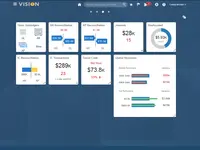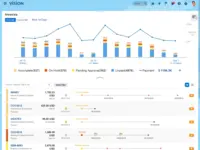Overview
What is Oracle Fusion Cloud ERP?
Oracle Cloud Enterprise Resource Planning (ERP) is a core suite of Oracle Cloud software-as-a-service (SaaS) applications. Oracle Expense Management and Oracle Risk Management are part of this solution. Other apps include Financials, Revenue Management, Accounting Hub, PPM, and Procurement.…
Recent Reviews
Awards
Products that are considered exceptional by their customers based on a variety of criteria win TrustRadius awards. Learn more about the types of TrustRadius awards to make the best purchase decision. More about TrustRadius Awards
Popular Features
- Accounts payable (225)8.585%
- Role-based user permissions (207)8.484%
- Accounts receivable (216)8.484%
- Standard reports (209)8.282%
Pricing
Entry-level set up fee?
- Setup fee required
Offerings
- Free Trial
- Free/Freemium Version
- Premium Consulting/Integration Services
Would you like us to let the vendor know that you want pricing?
169 people also want pricing
Alternatives Pricing
Features
Return to navigation
Product Details
- About
- Tech Details
- Downloadables
What is Oracle Fusion Cloud ERP?
Oracle Cloud Enterprise Resource Planning (ERP) is a core suite of Oracle Cloud software-as-a-service (SaaS) applications. Oracle Expense Management and Oracle Risk Management are part of this solution. Other apps include Financials, Revenue Management, Accounting Hub, PPM, and Procurement. The single cloud platform offers built-in industry standards and modern best practices.
ERP software is the backbone of many organizations and Oracle aims to offer a modern, connected approach combined with the ease and flexibility of the cloud. Oracle Cloud ERP solutions deliver the functionality, analytics, security, mobile capabilities, and social collaboration tools needed to run a business and optimize business processes.
A cloud ERP system can be implemented more rapidly and at lower costs than similarly-featured on-premises ERP solutions running on internal corporate data centers. Any employee can access cloud services and data in real time to stay on top of critical business functions, such as financial planning and analysis, financial reporting compliance and other financial services, as well as supply chain management and project management.
Oracle applications on the cloud have integrated artificial intelligence functionalities to enable advanced business intelligence and analytics features, so as to drive smarter decision-making throughout the enterprise by deriving actionable insights from massive quantities of data.
Oracle Fusion Cloud ERP Features
General Ledger and Configurable Accounting Features
- Supported: Accounts payable
- Supported: Accounts receivable
- Supported: Global Financial Support
- Supported: Primary and Secondary Ledgers
- Supported: Journals and Reconciliations
- Supported: Configurable Accounting
- Supported: Standardized Processes
Subledger and Financial Process Features
- Supported: Billing Management
- Supported: Cash and Asset Management
- Supported: Travel & Expense Management
- Supported: Budgetary Control & Encumbrance Accounting
- Supported: Period Close
Inventory Management Features
- Supported: Inventory tracking
- Supported: Automatic reordering
- Supported: Location management
Order Management Features
- Supported: Pricing
- Supported: Order entry
- Supported: Credit card processing
- Supported: Cost of goods sold
- Supported: Order Orchestration
Reporting & Analytics Features
- Supported: Dashboards
- Supported: Standard reports
- Supported: Custom reports
Customization Features
- Supported: API for custom integration
- Supported: Plug-ins
Security Features
- Supported: Role-based user permissions
- Supported: Single sign-on capability
- Supported: Multi-factor authentication
- Supported: User-level audit trail
Grants Management Features
- Supported: Award Lifecycle Management
Project Financial Management Features
- Supported: Budgeting and Forecasting
- Supported: Project Costing
- Supported: Cost Capture
- Supported: Capital Project Management
- Supported: Customer Contract Compliance
- Supported: Project Revenue Recognition
Project Execution Management Features
- Supported: Project Planning and Scheduling
- Supported: Task Insight for Project Managers
- Supported: Project Mobile Functionality
- Supported: Definable Resource Pools
Procurement Features
- Supported: Bids Analyzed and Compared
- Supported: Contract Authoring
- Supported: Contract Repository
- Supported: Requisitions-to-Purchase Orders Integrated
- Supported: Supplier Management
Risk Management Features
- Supported: Risk Repository
- Supported: Control Management
- Supported: Control Efficiency Assessments
- Supported: Issue Detection
- Supported: Remediation and Certification
Logistics Features
- Supported: Transportation Planning and Optimization
- Supported: Transportation Execution Management
- Supported: Trade and Customs Management
- Supported: Fulfillment Management
- Supported: Warehouse Workforce Management
Manufacturing Features
- Supported: Production Process Design
- Supported: Production Management
- Supported: Configuration Management
- Supported: Work Execution
- Supported: Manufacturing Costs
Supply Chain Features
- Supported: Forecasting
- Supported: Inventory Planning
- Supported: Performance Monitoring
Product Lifecycle Management Features
- Supported: Proposal Management
- Supported: Product Master Data Management
Oracle Fusion Cloud ERP Screenshots
Oracle Fusion Cloud ERP Videos
Make the Best Business Decisions with Oracle ERP Cloud
Oracle ERP Cloud: How Tomorrow's CFO Succeeds Today
Oracle Fusion Cloud ERP Technical Details
| Deployment Types | Software as a Service (SaaS), Cloud, or Web-Based |
|---|---|
| Operating Systems | Unspecified |
| Mobile Application | Apple iOS, Android |
| Supported Countries | 100+ countries and regions |
| Supported Languages | Arabic, Chinese-Simplified, Chinese-Traditional, Czech, Danish, Dutch, English, Finnish, French-Canada, French-France, German, Hebrew, Hungarian, Italian, Japanese, Korean, Norwegian, Polish, Portuguese-Brazil, Romanian, Russian, Spanish, Swedish, Thai, Turkish |













